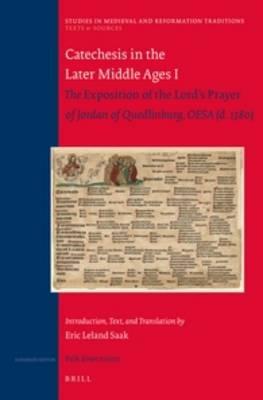Overview
In Catechesis in the Later Middle Ages I: The Exposition of the Lord's Prayer of Jordan of Quedlinburg, OESA (d. 1380)—Introduction, Text, and Translation, E.L. Saak presents the first edition and translation of the Exposition of the Lord's Prayer by the fourteenth-century Augustinian hermit, Jordan of Quedlinburg. This work, the first of six planned volumes of Jordan's Opera Selecta, contributes to our understanding of late medieval catechesis by focusing on a major pillar thereof, namely, the Pater Noster, bringing to light the importance of the Lord's Prayer to late medieval religion and the impact of Jordan's text on later authors, contributing thereby as well to the understanding of the emergence of the Catechism in the Reformation.
Full Product Details
Author: Eric Leland Saak
Publisher: Brill
Imprint: Brill
Volume: 188/6
Dimensions:
Width: 15.50cm
, Height: 2.50cm
, Length: 23.50cm
Weight: 0.771kg
ISBN: 9789004282742
ISBN 10: 9004282742
Pages: 18
Publication Date: 07 November 2014
Audience:
Professional and scholarly
,
Professional & Vocational
Format: Hardback
Publisher's Status: Active
Availability: Available To Order

We have confirmation that this item is in stock with the supplier. It will be ordered in for you and dispatched immediately.
Language: English, Latin
Reviews
...Saak offers not a critical edition in the traditional sense, but what he calls a study edition, or critically reliable and readable translations. His volumes are not exhaustive in their mining of original manuscripts, but they offer critical access to an all-too-long-ignored author and area of study. Saak succeeds in presenting the source material in a way that makes readers want more, and with five substantial volumes to come they will no doubt get their wish [...] Both the translation and the Latin text on which it is based are new creations, serving though to represent instrumentally Jordan's work of nearly 700 years ago in the hope that by doing so, Jordan's voice, now however distant and distorted, might, to the extent possible, be heard once again. I for one eagerly await the next volumes and am glad Saak gives Jordan voice once again after 700 years of relative silence. Roy Hammerling, Concordia College, in Medieval Review 2015
an impressive undertaking ... Saak offers modern students and scholars an important contribution to late medieval religion and particularly the Augustinian influence on the fifteenth century and beyond. The volume is a welcome addition for students and scholars of late medieval religion and we can only hope for the quick publication of subsequent volumes in this project. Ronald Stansbury, Roberts Wesleyan College. In: sehepunkte 16 (2016), Nr. 3 [15.03.2016]. ...Saak offers not a critical edition in the traditional sense, but what he calls a study edition, or critically reliable and readable translations. His volumes are not exhaustive in their mining of original manuscripts, but they offer critical access to an all-too-long-ignored author and area of study. Saak succeeds in presenting the source material in a way that makes readers want more, and with five substantial volumes to come they will no doubt get their wish [...] Both the translation and the Latin text on which it is based are new creations, serving though to represent instrumentally Jordan's work of nearly 700 years ago in the hope that by doing so, Jordan's voice, now however distant and distorted, might, to the extent possible, be heard once again. I for one eagerly await the next volumes and am glad Saak gives Jordan voice once again after 700 years of relative silence. Roy Hammerling, Concordia College. In: The Medieval Review 15.10.25 (2015).
""an impressive undertaking … Saak offers modern students and scholars an important contribution to late medieval religion and particularly the Augustinian influence on the fifteenth century and beyond. The volume is a welcome addition for students and scholars of late medieval religion and we can only hope for the quick publication of subsequent volumes in this project."" Ronald Stansbury, Roberts Wesleyan College. In: Sehepunkte 16/3 (15 March 2016). ""Saak offers not a critical edition in the traditional sense, but what he calls a ""study edition,"" or critically reliable and readable translations. His volumes are not exhaustive in their mining of original manuscripts, but they offer critical access to an all-too-long-ignored author and area of study. Saak succeeds in presenting the source material in a way that makes readers want more, and with five substantial volumes to come they will no doubt get their wish [...] Both the translation and the Latin text on which it is based are new creations, serving though to represent instrumentally Jordan's work of nearly 700 years ago in the hope that by doing so, Jordan's voice, now however distant and distorted, might, to the extent possible, be heard once again. I for one eagerly await the next volumes and am glad Saak gives Jordan voice once again after 700 years of relative silence."" Roy Hammerling, Concordia College. In: The Medieval Review 15.10.25 (2015). “Einer der gegenwärtig besten Kenner des mittelalterlichen Augustinismus und des Ordens der Augustineremiten, der amerikanische Historiker Saak, legt mit dieser Textausgabe einen weiteren Band seiner umfangreichen Beschäftigungen mit Jordan von Quedlinburg vor […]. Aufbereitung des Textes und Übersetzung erlauben einen detaillierten Einblick in die insgesamt sehr geringe Überlieferung von Kommentaren zum herrengebet und zugleich die vorhanden Geistesbeziehungen einer bestimmten Kommentatorengruppe, die […] für die Ausbildung des jungen Luther von erheblicher Bedeutung sein sollte.” Markus Wriedt, Goethe-Universität Frankfurt am Main. In: Archiv für Reformationsgeschichte, Jg. 45 (2016), pp. 8-9.
Author Information
Eric Leland Saak, Ph.D. (1993), University of Arizona, is Associate Professor of History at Indiana University, Indianapolis. His numerous publications include Creating Augustine (Oxford, 2012), and High Way to Heaven. The Augustinian Platform Between Reform and Reformation, 1292-1524 (Brill, 2002).




